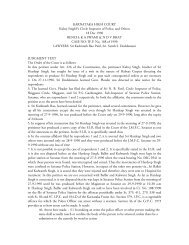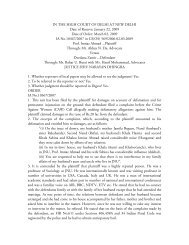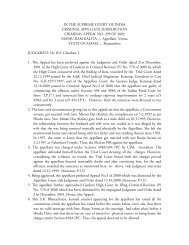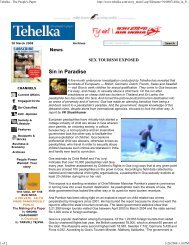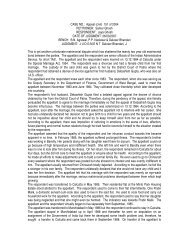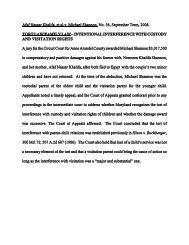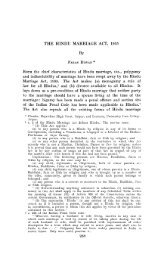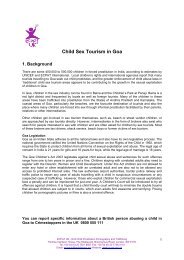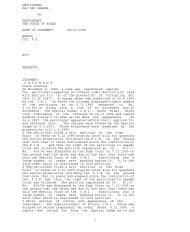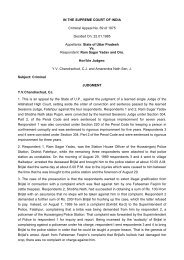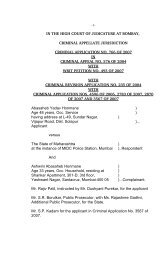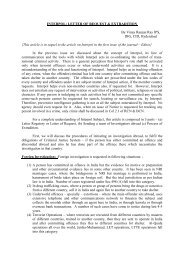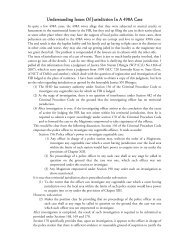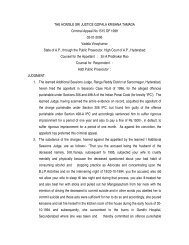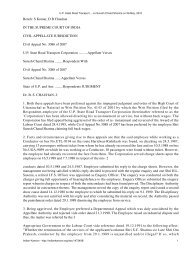AP HC Quotes Dowry Prohibition Act In Judgment: 2005 - IPC 498A
AP HC Quotes Dowry Prohibition Act In Judgment: 2005 - IPC 498A
AP HC Quotes Dowry Prohibition Act In Judgment: 2005 - IPC 498A
You also want an ePaper? Increase the reach of your titles
YUMPU automatically turns print PDFs into web optimized ePapers that Google loves.
than six months, but which may extend to two years and with fine which may extend to<br />
ten thousand rupees:<br />
Provided that the Court may, for adequate and special reasons to be mentioned in the<br />
judgment, impose a sentence of imprisonment for a term of less than six months.]<br />
It is no doubt true that summoning an accused, in a criminal case, is a serious<br />
matter and criminal law cannot be set in motion as a matter of course. The<br />
accused can approach this Court, under Section 482 Cr.P.C, to have the<br />
proceedings quashed `when the complaint does not make out any case against him<br />
and he is still required to undergo the agony of a criminal trial, for the<br />
provisions of Section 482 of the Code are devised to advance justice and not to<br />
frustrate it. (Pepsi Foods Ltd. v. Special Judicial Magistrate6).<br />
While exercising powers under the section, the Court does not function as a<br />
court of appeal or revision. <strong>In</strong>herent jurisdiction under the section, though<br />
wide, has to be exercised ex debito justitae to do real and substantial justice<br />
for the administration of which alone courts exist. Authority of the court<br />
exists for advancement of justice and if any attempt is made to abuse that<br />
authority so as to produce injustice, the court has the power to prevent abuse.<br />
It would be an abuse of process of the court to allow any action which would<br />
result in injustice and prevent promotion of justice. <strong>In</strong> exercise of these<br />
powers the Court would be justified in quashing any proceeding if it finds that<br />
initiation/ continuance of it amounts to an abuse of process of court or<br />
quashing of these proceedings would otherwise serve the ends of justice. The<br />
powers possessed by the High Court under Section 482 of the Code are very wide<br />
and the very plenitude of the power requires great caution in its exercise. The<br />
Court must be careful to see that its decision, in exercise of this power, is<br />
based on sound principles. The inherent power should not be exercised to stifle<br />
a legitimate prosecution. The High Court, being the highest court of a State,<br />
should normally refrain from giving a prima facie decision in a case where the<br />
entire facts are incomplete and hazy, more so when the evidence has not been<br />
collected and produced before the Court and the issues involved, whether factual<br />
or legal, are of magnitude and cannot be seen in their true perspective without<br />
sufficient material. (Minu Kumari Vs. State of Bihar7).<br />
Under Section 482 of the Code, the High Court has inherent powers to make such<br />
orders as may be necessary to give effect to any order under the Code or to<br />
prevent the abuse of process of court or otherwise to secure the ends of<br />
justice. But the expressions "abuse of the process of law" or "to secure the<br />
ends of justice" do not confer unlimited jurisdiction on the High Court and the<br />
alleged abuse of the process of law or the ends of justice can only be secured<br />
in accordance with law including procedural law and not otherwise. Further,<br />
inherent powers are in the nature of extraordinary powers to be used sparingly<br />
for achieving the objects mentioned in Section 482 of the Code. (Arun Shankar<br />
Shukla v. State of U.P.8)<br />
Exercise of power under Section 482 of the Code is the exception and not the



